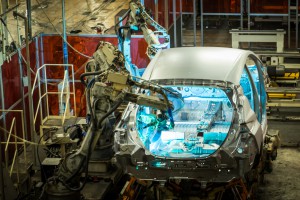
As the new Leaf begins rolling off assembly lines, Nissan officials are trying to determine what type of vehicle they'll electrify next.
Even as it launches its second-generation Leaf battery-electric vehicle, Nissan Motor Co. is looking to the future and considering what electrified products could come next.
“We might have a crossover EV shortly in the future,” Daniele Schillaci, the Japanese automaker’s global marketing and sales director told reporters on Thursday.
Such a move would not only expand the automaker’s line-up of all-electric models but move it into one of the world’s fastest-growing product segments. SUVs are especially popular in the U.S., where light trucks, in general, now account for almost two-thirds of the total new vehicle market.
“It’s totally logical for us, given the strong EV experience we’ve had, to see this technology one day will be carried to a crossover,” said Schillaci.
(Nissan expects 2018 Leaf to turnover new buyers. For the story, Click Here.)

Nissan has big plans for the electrification of its line-up down the road, including a crossover vehicle.
Nissan was the first automaker to put a battery-electric vehicle into high-volume production and, since its 2010 launch, the Leaf has been the most popular BEV in the world. But it has been running out of juice as the original model grew old, new alternatives have come to market, and as the result of continued low prices for gasoline.
Nissan is betting the second-generation Leaf will regain momentum, in part, due to its longer range, 150 miles with the 2018 model’s battery pack, almost double what the 2010 version delivered. And an optional battery pack capable of more than 225 miles will be added next year, Nissan officials have now confirmed.
The bigger pack would put Leaf more directly into competition with the likes of the 238-mile Chevrolet Bolt EV and the Tesla Model 3, though the California automaker is planning to soon release an optional 300-mile pack for its compact offerings.
Tesla, meanwhile, has forecast sales of the Model 3 will reach about 400,000 next year, while Nissan is looking for a much more modest 90,000 annual sales.
(Click Here for more about Nissan’s ProPilot autonomous technology.)
With the boom in demand for SUVs, Nissan might be taking aim at a segment where EVs have a significant opportunity to grow, or at least that’s what a number of analysts – and key competitors – are predicting.
Audi, for example, will launch a new fully-electric SUV next year, as will Jaguar with its I-Pace model. And a number of other manufacturers are expected to follow a similar product strategy in the next few years.
Electrifying an SUV offers some key advantages. There is a larger platform to work with, meaning more batteries can be squeezed in, especially with skateboard-like designs that mount batteries and electric drive systems into or underneath the load floor. That’s the approach taken by Tesla with its Model X battery-electric SUV.
On the downside, SUVs are larger and heavier, and typically create more aerodynamic drag, all adding up to lower range for the same amount of batteries when compared to a sedan or hatchback.
(To check out our guide to the 20 new EVs coming to the market by 2020, Click Here.)
The good news is that battery prices have fallen sharply since the Nissan Leaf was introduced, company insiders telling TheDetroitBureau.com that Nissan expects to soon be down to about $100 per kilowatt-hour compared to around $1,000 for lithium-ion batteries back in 2010. For a 200-mile range, requiring somewhere around 70 to 90 kWh, depending upon the vehicle, that can add up to tens of thousands of dollars in savings.
